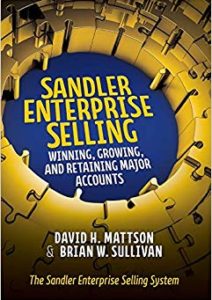The statistics are compelling. Most selling organizations generate 80% of their business from 20% of their clients. Winning a new large account costs up to 20 times more than keeping a current one. And just a small increase in a company’s major client retention percentage drives even greater revenue and profit increases. On the negative side, retention rate decreases spawn long-lasting negative impacts that can be crippling. And, unfortunately, we’re all familiar with the emotional and operational trauma that follows the news that a major client is moving on. Given the devastating impact of such losses, it would make practical business sense for selling organizations to focus keenly on keeping these lifeblood assets.
Most organizations, though, aren’t structured with account retention frameworks. Focusing on keeping major clients is typically viewed as a long-term initiative while the day-to-day, dominant charter is hitting the numbers – “What did you sell today?”. CRM systems highlight opportunities, probabilities and close dates that feed forecasts, quotas, and budgets. These activity dashboards have little connection to retention, as an initiative. So, organizations focus on quickly closing deals and fixing problems that threaten sales. Being responsive, of course, is important to all clients. But enterprise accounts are marketplaces in and of themselves, ecosystems demanding a holistic focus far beyond the reactive. Knowing intimately what matters most to each major account is vital. And applying that understanding to the critical factors that impact retention, customized to each account, is the fundamental basis for long-term relationships.
But how do you implement a large account retention framework? And how do you practically integrate it into a “What did you sell today?” model? If it doesn’t align with the daily activities and interactions your team conducts with your major accounts, it will be worthless. Or maybe it’ll get dumped into the annual account planning exercise, populated and shelved until same time next year. For a survival skill function like major account retention, you simply have to do better.
So, the framework must be realistic, based on the fundamental reasons why enterprise accounts choose to stay with you or part ways. In Sandler Enterprise Selling, we’ve built the Account Retention Tool to provide that practical roadmap to improve your most valuable relationships by focusing on those “stay or go” reasons – the 16 “Critical Retention Factors”:
- Your Delivery of Real Value
- Ease of Communication with the Account
- Your Buyer Network Coverage
- High-Level Executive Relationships
- Your Relevance in the Account – Going Deep and Wide
- The Variety of Products/Services you Deliver
- Your Wallet Share of Winnable Business
- The Duration of your Longest Current Contract
- Your Active Pipeline Opportunities with the Account
- Your Forecasted Account Revenue Growth
- The Profitability Levels in your Business with the Account
- Your Delivery Performance with the Account
- Your Account and Industry Understanding
- The Account’s Satisfaction Levels
- The Trust Levels in the Relationship
- The Account’s Dependence on You
Think about it. If you’re not consistently gauging your performance with a major account, constantly gaining knowledge to serve more effectively, you are vulnerable. Your very continuation is in jeopardy. For in the enterprise world, capable competitors are constantly building directed strategies to exploit your weaknesses and steal your key accounts. And don’t kid yourself – they know who your major clients are and they’re strategizing how to take them away. So, in retaining enterprise accounts, there’s no standing still. No status quo. There’s only action to be taken.
How does the process work? Your organization’s account team, consisting of sales, delivery and other critical resources connected to the specific account, meets and develops candid evaluations of your performance in each of the critical retention factors. These evaluations don’t represent what you hope your performance will be but what it actually is. And in true team selling fashion, the collaboration among team members ensures that these sessions truly make a difference.
But while there’s benefit in evaluations, the magic is in the forward motion. For in account retention, it’s all about identifying the specific actions to improve your position in each critical retention factor, enhancing your relationships. And with each improvement action is identified the individual accountable and the committed completion date.
Effectively employing a dynamic account retention process is a survival skill in enterprise selling, solidifying and expanding relationships over time. And having a practical framework mapped to selling and service models is crucial. It simply must be based on the customized reasons why a major account will want to be your long-term partner. Clearly understanding that, you’ve then earned the right to strategize how to make it happen.
And the grammar lesson? Of course. In terms of major accounts, retention is not a noun, it’s a verb. It’s not something you get. It’s something you do.



Comments